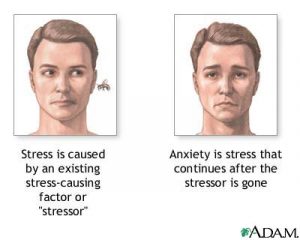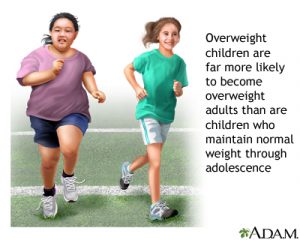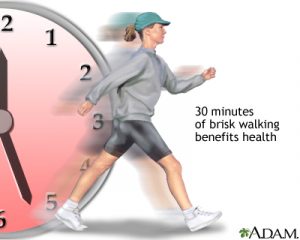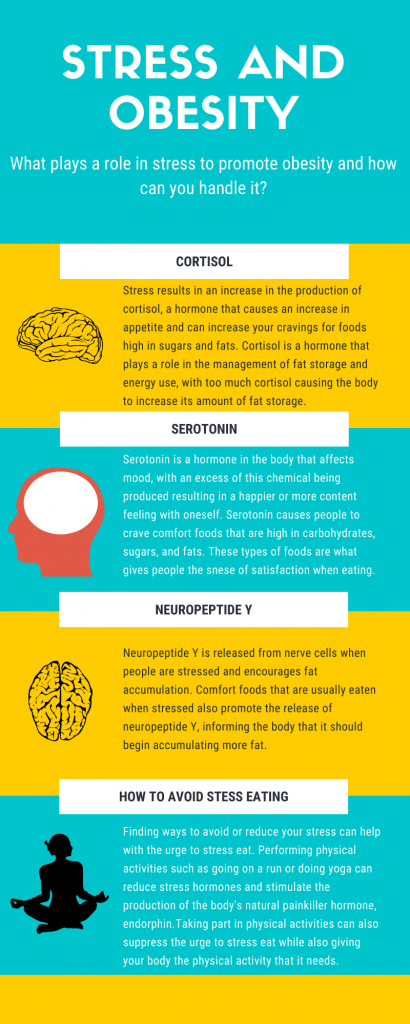7 Stress and Obesity
Conor Coleman
What is Stress?
Stress is how the body reacts emotionally, physically, or mentally to any sort of change. It is usually associated with negative events or situations in life, but even positive events in life can result in stress response, such as a job promotion or getting married. It plays a significant role in the body and can ultimately determine how the body reacts to certain situations. Stress has been proven to affect a person’s weight. Due to the biological and chemical changes that occur in the body when stressed, numerous studies have found that chronic stress can promote the development of obesity.

In a study conducted by Koch et al. (2008), over seven thousand Swedish families reported their psychological stress levels across four different domains. These domains comprised of serious life events, parenting stress, parental worries, and lack of social support, which were used to basically help give the participants a calculated level of stress that they could compare. The study found that 4.2% of the children were obese, but children that came from families that reported stress in at least two of the domains had significantly higher obesity rates (Koch et al., 2008). These findings suggest that psychological stress within a family could be a contributing factor to childhood obesity. The data found was extremely significant and shows just how important it is for families to know how their child is doing mentally. It is important to give both obese and non-obese children psychological and social support in addition to recommendations about potential lifestyle changes that should be made to help prevent and treat obesity. These recommendations can include exercise programs, ways to cope with stress, as well as how to talk about their feelings with others.

Stress-Related Hormones
One of the main reasons that stress promotes obesity is because of the hormones produced when a person is stressed causing one to feel hungry. When people eat comfort foods because they are stressed, there is a rise in the body’s serotonin levels when eating. Serotonin is a hormone in the body that affects mood and when there is an excess of this chemical being produced, resulting in a happier or more content feeling with oneself. This content feeling is correlated in the mind with eating and when someone is stressed, this is a strategy used to cope with the situation. Unfortunately, the comfort foods that are craved often contain a high amount of sugars and fats (Wilson & Sato, 2013). Alcohol is another item that is consumed during stress, which can result in unwanted calories. Therefore, it is easy to see how a consistent habit of eating or drinking comfort items when one is stressed can lead to weight gain.
Stress itself results in an increase in the production of cortisol, a hormone that causes an increase in appetite and can increase cravings for comfort foods (Thompson & Kennedy, 2009). The increase in cortisol can ultimately lead to the release of more serotonin if the behavior leads to more food being consumed. Cortisol also plays a role in the management of fat storage and energy use. When there is too much cortisol in the blood, it causes glucose to be converted and stored as fat. This type of fat production usually occurs within the abdominal area, which can increase one’s risk of metabolic syndrome, heart disease, and diabetes. Another hormone, Neuropeptide Y, is released from nerve cells when stressed and encourages fat accumulation as well. Comfort foods that are usually eaten when stressed also promote the release of neuropeptide Y, informing the body that it should begin accumulating more fat.
Since certain hormones are produced during stress, it may be hard for one not to “stress eat”. If someone does stress eat, encourage them to try to eat nutrient-dense snacks or foods in smaller portion sizes. Snacks that combine protein and carbohydrates together are beneficial because these types of food are digested more slowly and cause one to feel full for a longer period of time (Scott et al., 2012). To learn more about the right types of food to limit fat accumulation and other health issues, see chapter 2, Food and Calories.
How to Avoid Stress Eating

Developing strategies to reduce stress can help with the urge to stress eat. It is easier said than done but try to find an alternative activity or hobby during stressful periods that does not involve eating. Performing physical activities such as going on a run or doing yoga can help reduce stress levels by reducing levels of hormones, such as adrenaline and cortisol, and stimulate the production of endorphins, the body’s natural pain killers (Harvard Men’s Health Watch, 2018). Taking part in physical activities can also suppress the urge to stress eat while also giving the body the physical benefits associated with exercise.
Summary
Recent studies have shown that stress can play a significant role in the development of obesity. Biological factors, such as serotonin, cortisol, and neuropeptide Y, play a direct role in the craving for comfort foods that can result in the accumulation of fat and gaining weight. It is important to avoid stress eating by finding alternative activities, i.e. like meditating, doing yoga, or performing some kind of physical activity. Do not be afraid to talk to others about stressful situations as they may be able to offer advice and assurance during this time of need. Below is a brief infographic that touches on the main topics discussed in this chapter.

Review Questions
1. What hormone is released from nerve cells when stressed and causes the accumulation of fat?
d. Dopamine
2. What hormone is released when you eat comfort foods, ultimately affecting your mood?
a. Cortisol
b. Neuropeptide Y
c. Neuropeptide X
d. Serotonin
3. Which of the following is NOT a way you can lower your stress levels, without stress eating?
a. Finding a new hobby
b. Exercise
c. Yoga
d. All are ways to reduce stress
References
Koch, F., Sepa, A., & Ludvigsson, J. (2008). Psychological stress and obesity. The Journal of Pediatrics, 153(6), 839–844. doi: doi.org/10.1016/j.jpeds.2008.06.016
Harvard Men’s Health Watch. (2018, July 13). Exercising to relax. Harvard Health Publishing: Harvard Medical School. https://www.health.harvard.edu/staying-healthy/exercising-to-relax
Scott, K. A., Melhorn, S. J., & Sakai, R. R. (2012). Effects of chronic social stress on obesity. Current Obesity Reports, 1(1), 16–25. doi: 10.1007/s13679-011-0006-3
Thompson, B. D., & Kennedy, K. (2009, August 4). The link between stress and obesity. World Health Today. https://www.everydayhealth.com/diet-nutrition/food-and-mood/stress-and-dieting/stress-and-other-causes-of-obesity.aspx
Wilson, S. M., & Sato, A. F. (2013). Stress and pediatric obesity: What we know and where to go. Stress and Health, 30(2), 91–102. doi: 10.1002/smi.2501
food prepared in a traditional style having a usually nostalgic or sentimental appeal
a form of sugar
a syndrome marked by the presence of usually three or more of a group of factors (such as high blood pressure, abdominal obesity, high triglyceride levels, low HDL levels, and high fasting levels of blood sugar) that are linked to increased risk of cardiovascular disease and type 2 diabetes
any of various neutral compounds of carbon, hydrogen, and oxygen (such as sugars, starches, and celluloses) most of which are formed by green plants and which constitute a major class of animal foods
a system of physical postures, breathing techniques, and sometimes meditation derived from Yoga but often practiced independently especially in Western cultures to promote physical and emotional well-being

